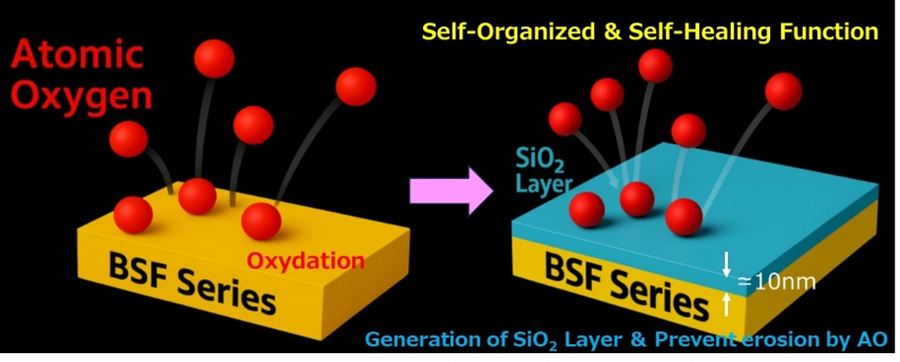SAKASE•ADTECH CO.,LTD. (“SAKASE•ADTECH”) , NIPPON STEEL Chemical & Material CO., LTD. (NIPPON STEEL Chemical & Material) and Axelspace Corporation (“Axelspace”) are pleased to announce that the Atomic-Oxygen (AO) Tolerant Polyimide Film “BSF-30,” developed by NIPPON STEEL Chemical & Material has been selected for use on the Deployable Deorbit Mechanism “D-SAIL,” a deorbiting device for satellites. This D-SAIL, co-developed by Axelspace and SAKASE•ADTECH, will be installed on all seven of Axelspace’s next-generation Earth observation microsatellites, GRUS-3, scheduled for launch in 2026.

There are currently thousands, possibly tens of thousands of satellites in Low Earth Orbit (LEO), and the accumulation of space debris has become a serious concern. Axelspace has established the “Green Spacecraft Standard,” a guideline for fostering sustainability in satellite development and operation, and has jointly developed D-SAIL with SAKASE•ADTECH to facilitate swift removal of satellites from orbit after their operational life ends, helping to protect the orbital environment. SAKASE•ADTECH is responsible for the design and manufacturing of the membrane deployment mechanical system for D-SAIL, while Axelspace mainly handles the electrical design and overall product functional design.
Incorporating the AO Tolerant Polyimide Film “BSF-30,” developed by Nippon Steel Chemical & Material, as the membrane material of D-SAIL, will mitigate membrane deterioration in the harsh LEO environment and improve the device’s durability and reliability in orbit.
Upon the termination of the satellite’s operation, D-SAIL deploys a membrane initially folded into a compact, fist-sized form, expanding into a surface area of approximately 2 m² which will encounter resistance of the faint atmosphere present in LEO. This will gradually reduce the satellite’s altitude, shortening the time required for the satellite to deorbit to just a few years to prevent the increase of space debris caused by collisions with other satellites or debris.
In addition, AO is produced in LEO when oxygen molecules in the atmosphere are decomposed by the Sun’s ultraviolet rays. AO causes oxidation of the satellite’s surface materials, leading to performance degradation and shortened lifespan. BSF-30 is an AO-resistant Siloxane-modified polyimide resin which forms a Silicon Dioxide (SiO₂) coating on the membrane to mitigate AO deterioration after D-SAIL’s deployment in LEO.

Through this initiative, SAKASE•ADTECH, NIPPON STEEL Chemical & Material and Axelspace will prevent the increase of space debris and contribute to improving space sustainability.
Axelspace’s development and demonstration of the versatile satellite bus for GRUS-3 and D-SAIL is based on outcomes of the following projects subsidized by the New Energy and Industrial Technology Development Organization (NEDO).
– Development and Demonstration of General-Purpose CubeSat and Microsatellite Buses (FY2023-2026)*supported by the Ministry of Economy, Trade and Industry from FY2021-2022
– Program to Support Ventures for Developing Space Components (FY2020-2021)
Related information can be found below:
Axelspace to Launch Seven Next-Generation Earth Observation Microsatellites “GRUS-3” in 2026
Axelspace’s D-SAIL selected for JAXA’s Innovative Satellite Technology Demonstration-4
Atomic-Oxygen Tolerant Film “Siloxane Block Polyimide BSF series” / NIPPON STEEL Chemical & Material
Nippon Steel Technical Report “Atomic-Oxygen Tolerant Material “Siloxane Block Polyimide” for Low & Very Low Earth Orbit Satellites”
Contact Information for Media
-
Axelspace Holdings Corporation, Business Administration Division, Corporate Development Group, PR&IR Unit
E-mail:pr@axelspace.com